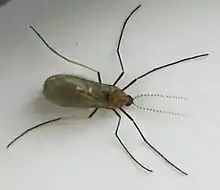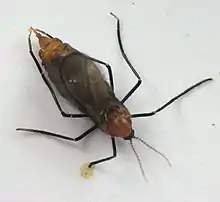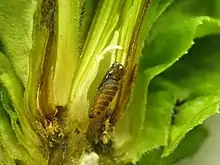| Rhopalomyia solidaginis | |
|---|---|
 | |
| Male | |
| Scientific classification | |
| Domain: | Eukaryota |
| Kingdom: | Animalia |
| Phylum: | Arthropoda |
| Class: | Insecta |
| Order: | Diptera |
| Family: | Cecidomyiidae |
| Genus: | Rhopalomyia |
| Species: | R. solidaginis |
| Binomial name | |
| Rhopalomyia solidaginis (Loew, 1862) | |
| Synonyms | |
| |
Rhopalomyia solidaginis, the goldenrod bunch gall, is a species of gall midges, insects in the family Cecidomyiidae The galls of this species have the following host species of goldenrods:Solidago altissima, Solidago canadensis, Solidago rugosa They have been found across eastern North American.


Gall and biology
This species is bivoltine and induces different bud galls in the spring and summer on three different host plants. The spring galls are small and difficult to locate. Galled plants are sometimes stunted. Each gall typically contains only one chamber in the middle of the apical meristem and contains a single larva. Occasionally 2-3 chambers are found in the same gall and may be attached to each other longitudinally.
For the summer galls there are white chambers that are similar to those in the spring galls appear in mid-July. Each chamber contains a single larva that faces downwards and is surrounded by a group of short and narrow leaves, which are in turn surrounded by longer and wider leaves that form a distinct subunit within the gall. Typically, 2-5 subunits are clumped together at the shoot apex to form a rosette gall that is 3–5 cm in diameter.
This is the second largest species of Rhopalomyia on goldenrods. Males can be recognized by their large and gonopods, and females have the shortest ovipositors of all Rhopalomyia species from goldenrods. Adults of the spring generation are somewhat smaller and have fewer antennal flagellomeres than adults of the summer generation, but adults and pupae of the two generations are otherwise similar morphologically.[1] [2] [3]

References
- Gall-Inducing Insects: From Anatomy to Biodiversity [4]
- A Catalog of the Cecidomyiidae (Diptera) of the World [5]
- ↑ Dorchin, Netta; McEvoy, Miles V.; Dowling, Todd A.; Abrahamson, Warren G.; Moore, Joseph G. (July 2009). "Revision of the goldenrod-galling Rhopalomyia species (Diptera: Cecidomyiidae) in North America" (PDF). Zootaxa. 2152 (2152): 1–35. doi:10.11646/zootaxa.2152.1.1. S2CID 85821972.
- ↑ Felt, Ephraim Porter (1917). "Key to American Insect Galls". New York State Museum Bulletin. 200: 95–97.
- ↑ "Rhopalomyia lobata information page". gallformers. Retrieved 2023-03-28.
- ↑ Fernandes, G. W.; Carneiro, M. A. A.; Isaias, R. M. S. (March 2012). Gall-Inducing Insects: From Anatomy to Biodiversity (PDF). pp. 369–395. Retrieved March 28, 2023.
- ↑ Gagné, Raymond J.; Jaschhof, Mathias (2017). "A Catalog of the Cecidomyiidae (Diptera) of the World, Fourth Edition" (PDF). Agricultural Research Service, US Department of Agriculture. Retrieved 2018-03-27.
Further reading
- Gagné, Raymond J.; Jaschhof, Mathias (2021). A Catalog of the Cecidomyiidae (Diptera) of the World, Fifth Edition (PDF). Agricultural Research Service, US Department of Agriculture.
External links
 Media related to Rhopalomyia solidaginis at Wikimedia Commons
Media related to Rhopalomyia solidaginis at Wikimedia Commons- Naturespot - cecidomyiidae
- INaturalist - Gall Project